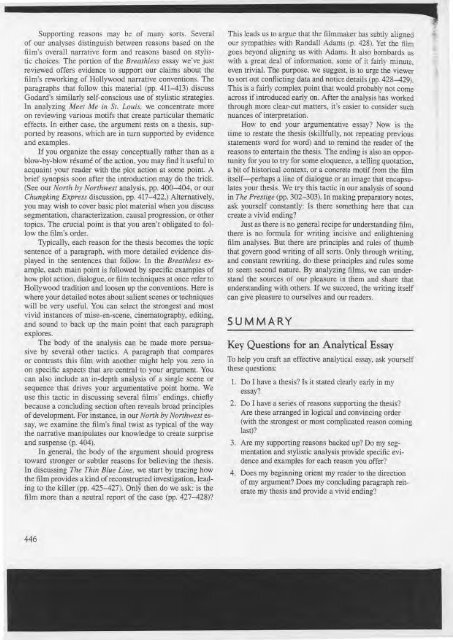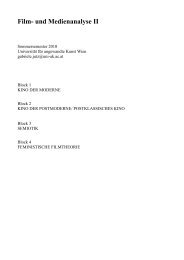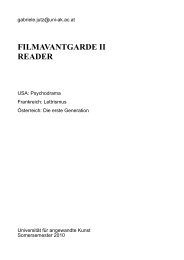Filmanalyse - Gabriele Jutz
Filmanalyse - Gabriele Jutz
Filmanalyse - Gabriele Jutz
You also want an ePaper? Increase the reach of your titles
YUMPU automatically turns print PDFs into web optimized ePapers that Google loves.
Supporting reasons may be of many sorts. Several<br />
of our analyses distinguish between reasons based on the<br />
film's overall narrative form and reasons based on stylistic<br />
choices. The portion of the Breathless essay we've just<br />
reviewed offers evidence to support our claims about the<br />
film's reworking of Hollywood narrative conventions. The<br />
paragraphs that follow this material (pp. 411-413) discuss<br />
Godard's similarly self-conscious use of stylistic strategies.<br />
In analyzing Meet Me in St. Louis, we concentrate more<br />
on reviewing various motifs that create particular thematic<br />
effects. In either case, the argument rests on a thesis, supported<br />
by reasons, which are in turn supported by evidence<br />
and examples.<br />
If you organize the essay conceptually rather than as a<br />
blow-by-blow resume of the action, you may find it useful to<br />
acquaint your reader with the plot action at some point. A<br />
brief synopsis soon after the introduction may do the trick.<br />
(See our North by Northwest analysis, pp. 400-404, or our<br />
Chungking Express discussion, pp. 417-422.) Alternatively,<br />
you may wish to cover basic plot material when you discuss<br />
segmentation, characterization, causal progression, or other<br />
topics. The crucial point is that you aren't obligated to follow<br />
the film's order.<br />
Typically, each reason for the thesis becomes the topic<br />
sentence of a paragraph, with more detailed evidence displayed<br />
in the sentences that follow. In the Breathless example,<br />
each main point is followed by specific examples of<br />
how plot action, dialogue, or film techniques at once refer to<br />
Hollywood tradition and loosen up the conventions. Here is<br />
where your detailed notes about salient scenes or techniques<br />
will be very useful. You can select the strongest and most<br />
vivid instances of mise-en-scene, cinematography, editing,<br />
and sound to back up the main point that each paragraph<br />
explores.<br />
The body of the analysis can be made more persuasive<br />
by several other tactics. A paragraph that compares<br />
or contrasts this film with another might help you zero in<br />
on specific aspects that are central to your argument. You<br />
can also include an in-depth analysis of a single scene or<br />
sequence that drives your argumentative point home. We<br />
use this tactic in discussing several films' endings, chiefly<br />
because a concluding section often reveals broad principles<br />
of development. For instance, in our North by Northwest essay,<br />
we examine the film's final twist as typical of the way<br />
the narrative manipulates our knowledge to create surprise<br />
and suspense (p. 404).<br />
In general, the body of the argument should progress<br />
toward stronger or subtler reasons for believing the thesis.<br />
In discussing The Thin Blue Line, we start by tracing how<br />
the film provides a kind of reconstruf ted investigation, h:a9ing<br />
to the killer (pp. 425-427). Only then do we ask: is the<br />
film more than a neutral report of the case (pp. 427-428)?<br />
446<br />
This leads us to argue that the filmmaker has subtly aligned<br />
our sympathies with Randall Adams (p. 428). Yet the film<br />
goes beyond aligning us with Adams. It also bombards us<br />
with a great deal of information, some of it fairly minute,<br />
even trivial. The purpose, we suggest, is to urge the viewer<br />
to sort out conflicting data and notice details (pp. 428-429).<br />
This is a fairly complex point that would probably not come<br />
across if introduced early on. After the analysis has worked<br />
through more clear-cut matters, it's easier to consider such<br />
nuances of interpretation.<br />
How to end your argumentative essay? Now is the<br />
time to restate the thesis (skillfully, not repeating previous<br />
statements word for word) and to remind the reader of the<br />
reasons to entertain the thesis. The ending is also an opportunity<br />
for you to try for some eloquence, a telling quotation,<br />
a bit of historical context, or a concrete motif from the film<br />
itself-perhaps a line of dialogue or an image that encapsulates<br />
your thesis. We try this tactic in our analysis of sound<br />
in The Prestige (pp. 302-303). In making preparatory notes,<br />
ask yourself constantly: Is there something here that can<br />
create a vivid ending?<br />
Just as there is no general recipe for understanding film,<br />
there is no formula for writing incisive and enlightening<br />
film analyses. But there are principles and rules of thumb<br />
that govern good writing of all sorts. Only through writing,<br />
and constant rewriting, do these principles and rules some<br />
to seem second nature. By analyzing films , we can understand<br />
the sources of our pleasure in them and share that<br />
understanding with others. If we succeed, the writing itself<br />
can give pleasure to ourselves and our readers.<br />
SUMMARY<br />
Key Questions for an Analytical Essay<br />
To help you craft an effective analytical essay, ask yourself<br />
these questions:<br />
1. Do I have a thesis? Is it stated clearly early in my<br />
essay?<br />
2. Do I have a series of reasons supporting the thesis?<br />
Are these arranged in logical and convincing order<br />
(with the strongest or most complicated reason coming<br />
last)?<br />
3. Are my supporting reasons backed up? Do my segmentation<br />
and stylistic analysis provide specific evidence<br />
and examples for each reason you offer?<br />
4. Does my beginning orient my reader to the direction<br />
of my argument? Does my concluding paragraph reiterate<br />
my thesis and provide a vivid ending?





![+ [R] - Gabriele Jutz](https://img.yumpu.com/7473913/1/190x245/-r-gabriele-jutz.jpg?quality=85)
![+ [R] - Gabriele Jutz - Sonance.net](https://img.yumpu.com/5987492/1/184x260/-r-gabriele-jutz-sonancenet.jpg?quality=85)